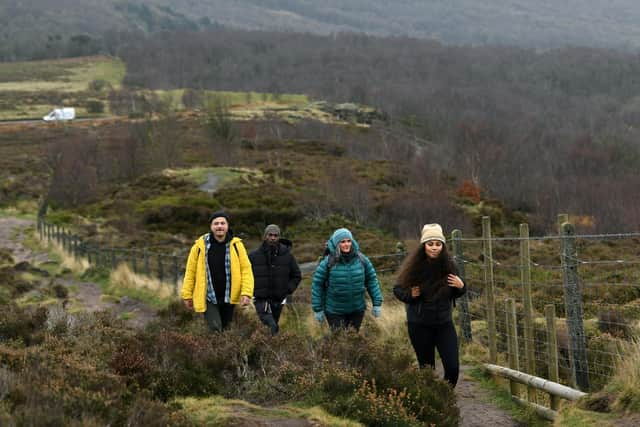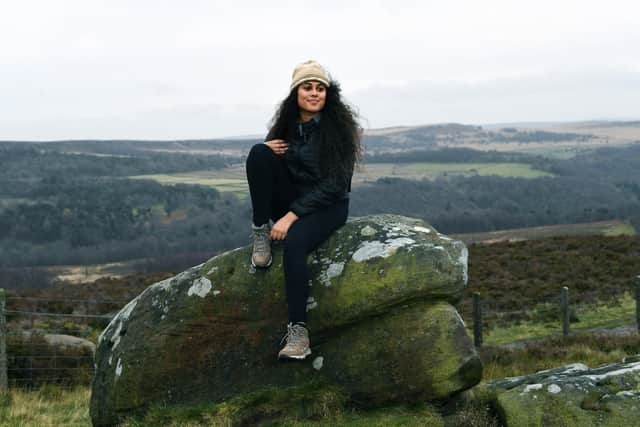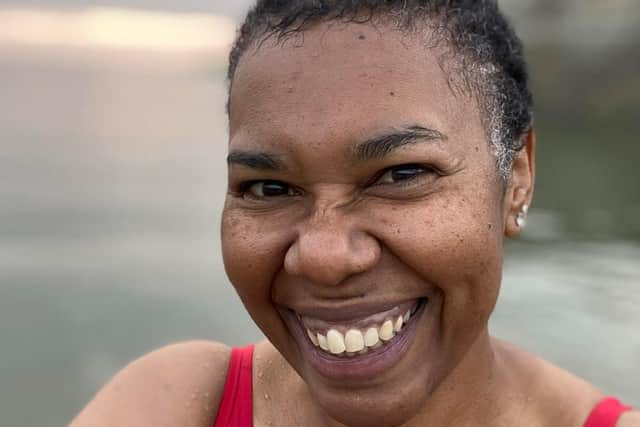The Yorkshire hikers and wild swimmers making the the Peak District, Yorkshire Dales and North York Moors National Parks more diverse
Escaping into nature has been a relief that so many have needed over the past two years.
However a growing number of organisations are pointing out that enjoyment of our natural landscapes is not equally accessible to all.
Advertisement
Hide AdAdvertisement
Hide AdOne group hoping to change this is Peaks of Colour, which Sheffield woman Evie Muir set up in the summer, hoping to share the benefits of getting outdoors with people in her community.


It offers monthly hikes in the Peak District for explorers and is run exclusively by and for people of colour.
Evie, 27, decided to start the informal group after discovering that hikes and wild swimming were a huge help to her wellbeing.
She says: “It was born out of my own personal experiences with mental health and trauma and how I rely so heavily on the Peak District for my trauma recovery – one of the core coping mechanisms I have being hiking and wild swimming – how much I lent into that so much more during lockdown, and how fortunate we are in Sheffield and surrounding areas to have the Peak District on our doorsteps to do so.”
Advertisement
Hide AdAdvertisement
Hide AdEvie, who lives in Nether Edge, works in charity sector supporting domestic abuse survivors who also have trauma, which led to her exploring why nature is so beneficial to recovery, but also the racial disparities of natural spaces.


Natural England, according to reports, has estimated that only one per cent of visitors to UK national parks – places such as the Yorkshire Dales, Peak District and North York Moors – come from Black and Minority Ethnic backgrounds ((BAME, a categorisation which some dispute in itself).
Campaign to Protect Rural England research also highlights how people from some backgrounds access the outdoors less than others.
Data that it published in August this year shows that ethnic minorities have on average 11 times less access to green space. And, of the time people from 'BAME' backgrounds spend in green spaces, only 15 per cent of it is in the countryside, compared to 38 per cent for people from white backgrounds.
Advertisement
Hide AdAdvertisement
Hide AdEvie says that if people from certain backgrounds are not going to those beauty spots, they are therefore excluded from the rejuvenating mental health and wellbeing benefits that can be found by discovering them. The group is also informed by Angela Davis’s concept of radical self-care – that you have to look after yourself in order to extend that kindness to others and improve the world.


However the group is “really informal”, with no expectation that attendees be skilled in hiking or outdoor pursuits.
“We offer a range of different walks for different abilities, durations and difficulties. And it’s essentially just an opportunity for people to switch off and to take a step out of the stresses of existing as people of colour in society into a space that we often feel isn’t ours to occupy and experience the benefits.”
Evie can list a number of barriers that people of colour may face when wanting to get out into the countryside, which can be financial – the cost of travel or the expense of walking kit such as suitable boots or waterproofs – but also racism.
Advertisement
Hide AdAdvertisement
Hide Ad“There is the barrier of racism and experiencing rural racism, which I think we’ve all felt to one degree or another whether that’s overt racism or microaggressions,” she says.
“Where you can walk into a country pub and be the only brown face in there and all heads turn when you walk in. Or people commenting as you walk past, or raised eyebrows. I think a testament to that is the amount of backlash people of colour face in online nature spaces.”
She says the group has encountered prejudice or a lack of understanding when using social media to promote its cause.
It has certainly caught on, with hundreds of people joining its Facebook and Instagram pages to keep track of members’ activities, while media exposure has helped to spread the word.
Advertisement
Hide AdAdvertisement
Hide AdMonthly hikes are getting between 10 and 20 attendees, which is quite enough for Evie to lead on her own at the moment, she says.
Some of her favourite trips so far have been to Ladybower Reservoir and Derwent Edge in the Peak District and around Baslow and the Chatsworth Estate.
Peaks of Colour is only one of so many similar groups that have been set up in recent years.
Black Girls Hike, Muslim Hikers, Sheffield’s Walk4Health, We Go Outside Too and Hijabi Runners Leeds are a few exmaples.
Advertisement
Hide AdAdvertisement
Hide AdCommunity interest company All the Elements, however, has recognised that large segments of the UK population are underrepresented, under-promoted and under-supported in outdoor spaces and tries to connect the individuals, community groups and organisations.
The organisation’s website has a directory of groups, which are not necessarily affiliated, but are suitable for people with differing racial, disability or gender and sexuality needs.
Collaborators of All The Elements include Dr Sheree Mack, who grew up in inner-city Bradford, surrounded by the dales and moors, but felt “nature was off limits mainly because of poverty and knowledge”.
Having gone through traumatic experiences, she also found solace in wild swimming after dipping her toes in the shorelines of the North-East, where she lives, and fell in love with nature.
Advertisement
Hide AdAdvertisement
Hide AdShe previously told National Parks UK: “I would go in and felt cleansed, so many of my different identities would slip away and I would recognise myself in the water with the cliffs around; I felt the twin sense of being both powerful and insignificant.”
Soraya Abdel-Hadi, founder, says: “I set up All The Elements because I was looking to connect with others working on increasing diversity in the UK outdoors, across all the different diversity areas.
“The mainstream outdoor narrative has traditionally focused on one type of person, when everyone should be able to benefit from time in nature.
“There were all these amazing individuals and group leaders out there doing this work, but they weren’t connected to each other.
Advertisement
Hide AdAdvertisement
Hide Ad“All The Elements works to support connections between community members, peer-to-peer learning and group development, as well as amplifying the work that is being done to increase access and representation.
“It has been very positively received by those who are part of our community, which includes community groups, outdoor sector organisations, such as National Parks, and businesses and brands.”
For more information about Peaks of Colour, visit its Facebook or Instagram pages. All The Elements’ website can be found at www.alltheelements.co.
